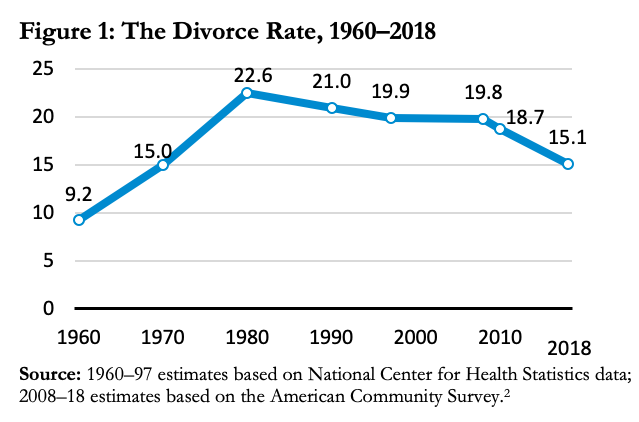There are two kinds of pieces I write that tend to generate the most negative responses. The first is obvious: anything that’s critical of Donald Trump. The second might surprise you. Anytime I argue that our culture isn’t circling the drain and that some things are in fact getting better, I often encounter vicious blowback.
I think I know why. The second argument is connected to the first. Much of the case for Donald Trump—indeed, much of the case for the new, nationalist right (or, for that matter, Bernie Sanders and the democratic socialist left)—depends on the case that desperate times call for desperate measures. But if the times are not desperate, then the argument to “burn it all down” or “join the revolution” loses its resonance.
Few areas of our nation’s culture generate a greater sense of despair than discussions of marriage and family. Ask a cultural conservative about the sexual revolution, and you’re likely to hear a simple response. “We lost.” Sexual revolutionaries have fractured the family, cultural revolutionaries have redefined marriage, feminists have dehumanized unborn children, and now the radical vanguard is even redefining gender itself. Conservatives didn’t just lose in a rout—the rout continues.
It’s true that if you compare contemporary America to, say, 1965, the American family is in a desperate state. Divorce and illegitimacy rates are much higher. Marriage bonds were once deemed a sacred covenant between a man and a woman, difficult to break absent proof of narrow grounds for termination. Now, it’s a voluntary relationship between two people, with the marriage certificate itself less binding than a refrigerator warranty. It can be terminated, without penalty, for any reason or no reason at all.
As for abortion? In 1965 states had the freedom to ban the practice. Now? They struggle to implement even the most modest restrictions..
The law and culture have changed time and again to be more permissive, and for a time human behavior followed suit. Divorces soared as divorce laws loosened. Illegitimacy soared as illegitimacy lost its social stigma. In the eight years following Roe, the abortion rate skyrocketed.
But then, something happened. The law remained permissive, but behavior became more conservative. As the invaluable Brad Wilcox notes in his recent testimony before the Senate Joint Economic Committee (if you care about family issues, follow Brad on Twitter), by several measures American family life is getting better. For example, divorce rates are down:

The share of kids living in intact married families is up:

He also notes that the uptick has been driven in part by a meaningful increase in married parents of black children. The overall unmarried birth rate is down 23 percent from its peak in 2007 and 2008.
Moreover, if you regularly read me, you’ll know that this is one of my favorite charts. Why? Because it signals a dramatic culture change that is saving lives:

And, lest you wonder, the latest statistics show that the decline in abortion rates continued beyond 2014. It’s now well below the abortion rate when Roe was decided.
What is going on? There’s no easy answer. We can’t point to a specific set of public policies that have helped repair the family, and many of the most recent abortion restrictions were passed well after the rate began to fall. In fact, most of the recent restrictions passed in states with already-low abortion rates.
Before you object, no I’m not arguing that policy doesn’t matter. I’m saying that more is going on, and I’ve got an idea what at least some of that “more” might be. I can sum it up in one word – experience. Or, to put it another way, a generation of Americans tasted the fruits of libertinism and family instability and many of them recoiled. The human cost created a generational reaction.
If you’re an older member of Generation X, like me, you came of age at the height of both the divorce rate and the abortion rate. Many of my friends were latchkey kids who watched their parents fight and their families break up. Some used abortion as a form of birth control, only to be shocked at the recurring emotional toll as the anniversary of each abortion or each due date brought their incalculable loss back to the front of their minds.
It’s as if millions of members of my generation (though not all, certainly) said to themselves, “Nope. Not me. Nope, not my kids.” Latchkey kids became helicopter parents. The children of divorce vowed to stay married. And as the economic and emotional fruits of intact families became so undeniably apparent (it’s hard to believe that 30 years ago smart people actually disputed whether there were net negative effects of growing up without two parents), they transformed their marriages back from contracts into covenants.
Make no mistake, I’m not saying “everything is okay.” As Brad notes in his testimony, the upward economic mobility of intact families is leaving America with a deep “marriage divide.”
Moreover, I’ve written extensively about American deaths of despair, a phenomenon that’s driven in part by a shockingly disproportionate death toll in single men:
But the reasons for concern don’t cancel out the reasons for hope, and as the culture continues to rediscover the ancient virtues of marriage and family, there may well be reason to believe that the positive social trends will continue. Time will tell, of course, and good public policy can perhaps help nudge the culture in the right direction. In his testimony, Wilcox proposes a number of reasonable economic reforms. But whenever one hears tales of cultural disaster and woe, it’s worth remembering that there’s a big picture, and that big picture shows evidence that key parts of our social fabric are on the mend.
PragerU just lost a key court case. Good.
First, I like Prager University. I like the idea, and while I haven’t seen all of its content (and can’t endorse all its videos), many of the videos I have seen are well-produced, interesting, and accurate. For millions of Americans, they’ve provided a helpful corrective to the progressive conventional wisdom they often hear at school and on campus. In fact, I’ve done a PragerU video. You can see it here:
While PragerU has been phenomenally successful on YouTube, it’s also had its struggles with the platform. As the 9th Circuit Court of Appeals explained, “YouTube tagged several dozen of PragerU’s videos as appropriate for the Restricted Mode. YouTube also ‘demonetized’ some of PragerU’s videos, which means third parties cannot advertise on those videos.”
So PragerU sued YouTube, and (ironically enough) its principal free speech argument was in fact a threat to free speech. It asked the court to treat YouTube (a private company) as if it were the government and require YouTube to comply with First Amendment restrictions against censorship.
There’s one obvious problem, however. The First Amendment protects private citizens from government censorship. It does not protect private citizens from censorship by private organizations. PragerU’s suit sought to change the law, arguing that “YouTube is a state actor because it performs a public function.”
YouTube won Wednesday. The 9th Circuit affirmed the trial court’s decision to dismiss PragerU’s case. The court noted that YouTube’s alleged “public function”—“hosting speech on a private platform” was hardly the equivalent of government action. The court was clear:
Importantly, private property does not “lose its private character merely because the public is generally invited to use it for designated purposes.” YouTube may be a paradigmatic public square on the Internet, but it is “not transformed” into a state actor solely by “provid[ing] a forum for speech.” (Citations omitted.)
All too many conservatives have reacted to isolated incidents of unfair social media censorship by demanding fundamental changes to American law. While corporations are obviously prohibited from engaging in invidious discrimination on the basis of race, religion, sex, and other protected classes (depending on federal, state, and local law), the First Amendment has long protected their rights to advance a certain set of moral and even religious values according to the beliefs and goals of their owners.
The desire of conservatives to have a right of access, free of charge, to platforms they didn’t create and that are run according to the values of their creators isn’t sufficient reason to override First Amendment doctrine and inject government oversight into the speech policies of private corporations.
Moreover, be careful what you ask for. The First Amendment protects a wide variety of speech, including speech (like various types of pornography and truly hateful comments and commentary) that most Americans would find both shocking and wholly inappropriate for platforms millions of children utilize, often without parental oversight.
I’ve long argued that social media companies should voluntarily adopt First Amendment-based rules. Why voluntarily? Because it’s not the role of the government to dictate private speech policies, and different tech platforms have different values, target audiences, and business strategies. Some, like Facebook and Instagram, are more family-friendly. Others are far more permissive. A voluntary First Amendment ethic would still permit customization and variation consistent with corporate values. That’s what freedom looks like, and if you don’t like the look, you don’t have to be on the platform.
One last thing …
I need to fall on my sword. During our most recent podcast, Sarah and I were raving about the great, incredible, and wonderful story of David Ayres—the 42- year-old kidney transplant survivor and Zamboni driver who took the ice as the “emergency backup goalie” for the Carolina Hurricanes in a game against the Toronto Maple Leafs. But there was one problem. I kept saying that he played for the Avalanche. I got my natural disasters mixed up! My deepest apologies to Ayres, the Hurricanes, and to all our listeners. As an act of atonement, here are David’s highlights:
Photograph of family walking their children by Jeffrey Greenberg/Universal Images Group via Getty Images.







Please note that we at The Dispatch hold ourselves, our work, and our commenters to a higher standard than other places on the internet. We welcome comments that foster genuine debate or discussion—including comments critical of us or our work—but responses that include ad hominem attacks on fellow Dispatch members or are intended to stoke fear and anger may be moderated.
With your membership, you only have the ability to comment on The Morning Dispatch articles. Consider upgrading to join the conversation everywhere.